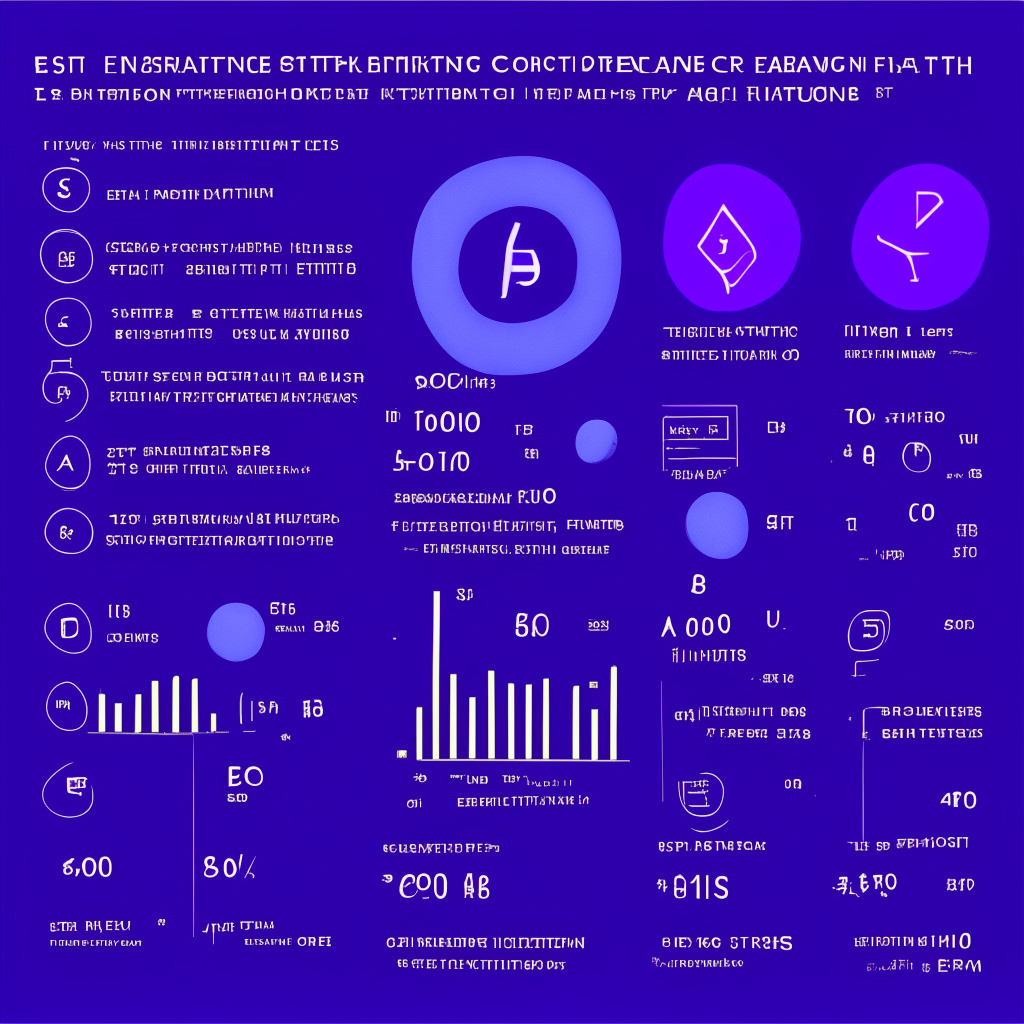Tether announces plans to allocate up to 15% of its reserves to invest in Bitcoin, citing its robustness and growing popularity. Meanwhile, innovative projects like AiDoge, Conflux, and ecoterra reflect the dynamic nature of the cryptocurrency market. Investors must stay vigilant and make informed decisions to capitalize on this growth.
Day: May 17, 2023
SEC vs Grayscale: Is Filecoin a Security? Examining the Debate and Its Impact on Crypto
The SEC now considers Filecoin’s native token, FIL, to be a security, resulting in Grayscale Investments challenging the regulator’s viewpoint. Amid increasing regulatory crackdown on crypto products, this decision raises questions about the extent of oversight in the industry and the balance between innovation and protection.
dYdX’s Decentralization Journey: Balancing Governance & Efficiency with subDAOs
dYdX, a decentralized platform known for perpetual contracts, is exploring the establishment of additional subDAOs to further decentralize its ecosystem management. As dYdX upgrades to its fourth version on the Cosmos blockchain, it aims to create a more inclusive governance model by allowing the wider community to actively participate in decision-making, potentially setting a precedent for decentralized trading platforms.
Crypto Wallet Wars: Ledger Recover Controversy and Competitors Capitalizing on Privacy Fears
Ledger faced backlash after introducing Ledger Recover, raising concerns about closed-source firmware and data leaks. Competitors Blockstream, Trezor, Cold Card, and BitBox slashed prices, emphasizing privacy and self-custody. The situation highlights trust, privacy, and user preference when choosing crypto wallets.
AI vs Humanity: Balancing Benefits and Threats Amid Rapid Development
A recent Reuters/Ipsos poll shows 61% of Americans view artificial intelligence (AI) as a threat to humanity. This concern stretches across industry leaders like Elon Musk and Warren Buffett. Calls for regulation, transparency, and cooperation emerge to balance AI’s benefits and potential risks.
Bitcoin’s Z-Score Dips Below 1.0: Opportunity to Invest or Cause for Concern?
Bitcoin’s Z-score to its 200-Day Moving Average (200DMA) dropped below 1.0, signaling weakened price momentum. Factors such as US crypto regulation uncertainty, possible interest rate cuts, and surging transaction fees contribute to this decline. However, a Z-score close to 1.0 could present a good medium to long-term buy signal, as macro conditions are expected to improve and technical indicators suggest a new bull market.
Voyager Bankruptcy: A Lesson in Crypto Market Risks and Due Diligence
Crypto brokerage Voyager faces liquidation after failed asset sales to FTX and Binance.US, raising questions about the company’s management. This highlights the importance of due diligence and cautious investment strategies in the volatile crypto market.
Bitcoin Smart Contracts: Revolutionizing Crypto or Crippling the Network?
Cryptocurrency developer Punk3700 launched the claimed first Bitcoin-based smart contract, reigniting the debate between Bitcoin maximalists and those open to diverse blockchain technologies. Projects like metaverses and an Ethereum Virtual Machine for Bitcoin raise concerns about network congestion and higher transaction fees, potentially discouraging users in developing countries.
Stablecoin Regulation Debate: Balancing Innovation, Dollar Dominance, and Securities Frameworks
The House Financial Services Committee’s Subcommittee is working towards regulating payment stablecoins, emphasizing the importance of dollar dominance and financial inclusion. While the SEC suggests regulating stablecoins through a securities framework, there is strong bipartisan consensus to treat them as cash instruments, with draft bills proposing prudential frameworks including capital requirements, redemption timeframes, and AML/KYC compliance.
SEC Deems Filecoin a Security: Crypto Community Divided on Market Impact and Innovation
The US SEC has determined that Filecoin (FIL) is a security, triggering a potential debate within the crypto community regarding classification and regulatory status. As authorities continue to scrutinize digital assets, it’s vital for market participants to stay vigilant and find a balance between fostering innovation and ensuring investor protection.
SEC Labels Filecoin’s FIL Token a Security: Unveiling the Impact on Blockchain Industry & Investors
The U.S. SEC has reportedly labeled Filecoin’s native cryptocurrency, FIL, as a security, according to an announcement by Grayscale Investments. This development raises concerns about Filecoin’s progress and adoption but may also be seen as a positive step towards regulating the cryptocurrency market, providing better disclosure and preventing market manipulation.
SEC vs Grayscale: Filecoin Trust Battle & Cryptocurrency Regulation Dilemma
The SEC recently requested Grayscale to withdraw its application for a Filecoin Trust product, igniting a debate about cryptocurrency classifications as securities. Grayscale plans to respond, arguing FIL isn’t a security. The regulatory outcome may affect the growth and innovation of the cryptocurrency industry.
U.S. States Battle Over CBDCs: Privacy Fears, Rising Tension, and a Divided Future
Florida recently banned central bank digital currencies (CBDCs), sparking interest from states such as Louisiana, Alabama, Texas, and North Dakota who also drafted opposition bills. Privacy concerns, government control, and individual freedom are key factors contributing to the contentious debate on CBDCs in the US.
Blockchain Battles Miami Housing Crisis: Captain Haiti’s $5M NFT-Real Estate Initiative
Captain Haiti Foundation partners with Dargent Group, raising $5 million to utilize blockchain technology to combat Miami’s housing crisis and preserve Haitian culture. The initiative focuses on helping Little Haiti residents acquire land and real estate, while limited edition NFTs facilitate unique real estate market opportunities.
Pakistan’s Crypto Ban: Balancing FATF Compliance and Economic Growth Dilemma
Pakistan plans to ban cryptocurrency services and trading, aiming to meet Financial Action Task Force requirements. However, this decision faces mixed reactions as supporters argue it’s necessary, while critics caution it may hinder economic growth and deprive citizens of income sources.
Ether Struggles Amid Regulatory Pressure, Market Shifts, and Liquidations
Ether price experienced a decline after Chinese regulators targeted the NFT market and UK lawmakers pushed for crypto regulation. Factors affecting Ether’s price include Ethereum leveraged liquidations, shifting regulatory focus, and increased deposits on centralized exchanges, leading to uncertain expectations for 2023.
Unioverse: Revolutionizing Blockchain Gaming or Exposing Security Risks?
The Unioverse franchise by Random Games introduces Reyu, the first playable character NFT, in their innovative blockchain gaming development. Combining engaging visual illustrations, a captivating mini-game called “The Proving Grounds,” and immersive gameplay, Unioverse aims to revolutionize the gaming industry while fostering blockchain technology adoption and growth.
US Debt Default and Stablecoins: How Circle Aims to Protect USDC Reserves with Repo Agreements
Circle Internet Financial is adjusting the reserves behind the $30 billion USD Coin, considering the possibility of a U.S. government debt default. BlackRock manages the Circle Reserve Fund, now incorporating $8.7 billion in overnight repo agreements as extra protection for the USDC reserve.
Exploring High-Frequency Trading in Crypto: Opportunities, Strategies, and Regulation
The incorporation of high-frequency trading (HFT) in crypto markets has sparked both excitement and skepticism. Keone Hon, CEO of Monad Labs, discusses HFT’s potential challenges, strategies, and the need for sensible regulation in the crypto landscape. As crypto markets mature, opportunities for HFT may decrease, highlighting the importance of decentralized exchanges and clear regulatory frameworks for efficient operation.
Citadel Securities Sues Ex-Employees for Crypto Trade Secret Theft: Analyzing the Implications
Citadel Securities is suing former employees Leonard Lancia and Alex Casimo, founders of crypto market-making firm Portofino Technologies, accusing them of stealing trade secrets and employee poaching. The lawsuit highlights concerns over proprietary information protection in the evolving cryptocurrency market and emphasizes blockchain technology’s growing significance in finance.
Ethereum’s Block Finality Crisis: Uncovering Security Gaps and Ensuring Future Stability
The Ethereum blockchain experienced a temporary loss of block finality last week, raising concerns about its functionality and security. The cause remains under investigation, with potential consequences including security issues like reorgs. Incidents have exposed areas for improvement in creating a more resilient Ethereum network, emphasizing the importance of finality for blockchain stability.
Ethereum’s Proof of Stake Future: The Impact of Standardized Staking Rates and New Financial Products
The development of a standardized Ethereum staking rate benchmark, representing daily, annualized mean of on-chain rewards, could impact the cryptocurrency landscape. This rate could unlock the next generation of financial products and serve as a building block for Ethereum’s monetary policy, providing reference rate utility for market participants, and enabling risk transfer tools like swaps and futures.
South Korea PM Pushes for Crypto Asset Disclosure by Public Officials: Opportunities and Risks
South Korean Prime Minister Han Deok-soo calls for high-ranking public officials to disclose and register cryptocurrency assets. Emphasizing the need for crypto asset inclusion in property registration, the push aligns with existing requirements for valuable assets like precious metals.
Crypto Regulations Loom as Bitcoin Price Surges: Pros, Cons, and Potential Impact
Bitcoin’s price recently experienced an upward movement, generating curiosity among investors. As regulatory news influences risk appetite, US Democrats aim to solidify the SEC’s authority over crypto, and the UK’s Treasury Committee advocates for regulating retail crypto trading as gambling. The upcoming $735 million Bitcoin options expiry on May 19 could impact the price’s direction.
US Secret Service Embraces Crypto: Blockchain’s Expanding Influence and Challenges Ahead
The United States Secret Service acknowledged the potential of blockchain technology in combating financial crime during a Reddit AMA, highlighting it as an “amazing opportunity” for law enforcement. Meanwhile, blockchain’s influence in various domains is growing, transforming areas like gaming franchises and shaping industries through influential figures like Elon Musk and Satoshi Nakamoto.
Optional Wallet Recovery Feature: Ledger Addresses Community Concerns & Skepticism
Ledger’s CTO, Charles Guillemet, addresses community concerns over the wallet recovery feature, emphasizing it as an entirely optional choice for users. Despite skepticism, Guillemet reassures that neither Ledger nor trusted providers can access user secrets or passphrases.
Uniswap’s Integration with Moonbeam: Benefits and Challenges for the Decentralized Exchange
Uniswap crypto exchange is set to become available on Moonbeam, a Polkadot parachain, following a proposal by Blockchain at Michigan. The integration aims to increase volume and liquidity, offering benefits in terms of speed, security, and interoperability to Uniswap users, essential for the exchange’s continued growth and success.
Crypto YouTuber BitBoy Dumps BEN Tokens: Community Shocked and Divided
Popular digital currency YouTuber Ben Armstrong, known as BitBoy Crypto, reportedly dumped all his BEN token holdings just a week after promising to lock them for six months. The selloff is being labeled as a rug pull event, common in the digital currency world, where the token’s value is expected to drop. Despite this, the BEN token maintains a market capitalization of $33.96 million.
US Debt Ceiling Talks: Impact on Crypto and Key Support Levels to Watch
The cryptocurrency market struggles as Bitcoin slips below $27,000 and investors face macro uncertainty. Despite short-term negativity, Bitcoin’s chart structure remains unbroken, signaling a potential bullish move. Meanwhile, Ether, BNB, and XRP are experiencing fluctuations, requiring close monitoring of key support levels for a possible rally.
MicroStrategy vs Coinbase: A Safer Bet Amid Regulatory Pressures and Market Performance
MicroStrategy, the largest public holder of Bitcoin, is considered a safer investment compared to Coinbase due to ongoing regulatory issues faced by Coinbase. With the SEC increasing scrutiny on the crypto sector, MicroStrategy’s shares have outperformed Coinbase, providing an “attractive alternative” amid regulatory pressures.
Breaking Down Barriers: Making DeFi Platforms Accessible and User-Friendly for Mass Adoption
A recent Uniswap Labs survey highlights potential barriers to DeFi adoption, including complexity and cost associated with on-chain trading. The crypto community must work together to educate users, simplify fee structures, and make DeFi platforms more approachable, fostering mass adoption.
Fahrenheit Vs Coinbase: Battle for Celsius’s $2 Billion Crypto Assets Heats Up
Fahrenheit consortium, including Arrington Capital and U.S. Bitcoin Corp, leads the bidding for bankrupt lender Celsius’s $2 billion in assets, including mining units and staked cryptocurrency. Coinbase is also reportedly involved, while Michael Arrington proposes a new company to manage assets and grow stakeholder value.































